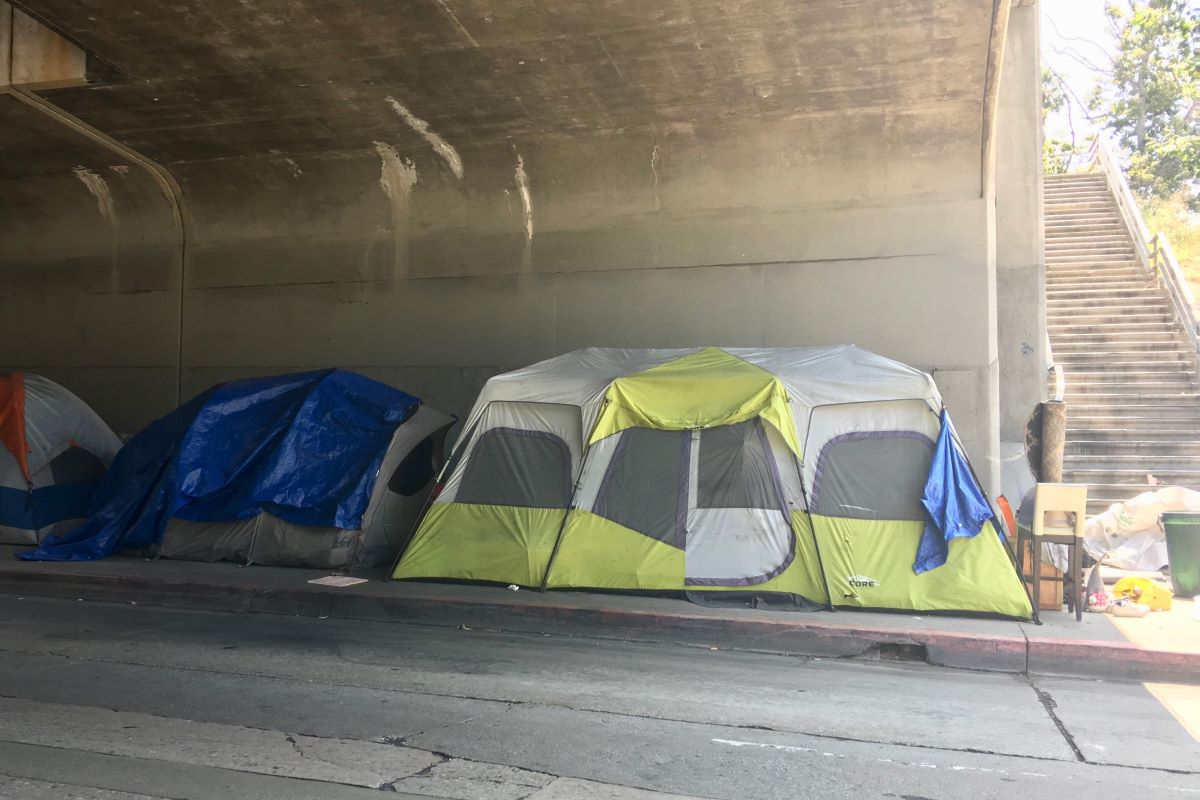The Ripple Effect: How Homelessness Touches Every Aspect of Society
Homelessness ties into many other social issues, creating a less safe world for everyone.
From the outside, it might look like an isolated problem fueled by personal decisions or individual flaws. But, just as the homeless crisis itself is systemic, the consequences of the situation are communal.
Individualism might serve as a secondary cause of homelessness because it encourages us to see one another as rivals rather than neighbors. But make no mistake about it. That person you see situated on a park bench or living out of their car is emblematic of a whole community—and not just any community—your community.
From hospital funding and public health to school system rankings and housing affordability, homelessness is a crisis that causes and is caused by glaring community problems. Its very existence is hurting us all.
Here are some examples of other crises caused by homelessness, causing homelessness, or, in some cases, both.
The Family Separation Crisis
According to research presented for the 139th Session of the Human Rights Committee, Geneva, a child is removed from their home in the United States of America every 3 minutes. This amounts to an astounding 480 instances of child separation each day.
Family separation disproportionately affects communities of color, especially African American and Indigenous families. These two historically oppressed groups are also more likely to endure homelessness, abject poverty, and discrimination both inside and outside of the child welfare system.
The statistical disadvantages of systemic discrimination appear endless, and the real-life consequences of the mass removal of children from their homes are well documented. Studies show that when children are forcibly taken from their biological parents, especially in instances where insufficient housing is the sole issue, as is the case in many of these situations, the children suffer in one or more of the following ways:
- Depression
- Regression
- Anxiety
- Decreased academic performance
- Higher rates of dropping out of grade school
- PTSD
- Toxic stress
- Cognitive development delays
- Increased risk of developing heart disease, diabetes, and even certain types of cancers, and the list goes on and on
Family separation is highly detrimental to society because it poses problems that follow these removed children well into adulthood, putting them at higher risk of perpetuating cycles of poverty and homelessness themselves.
If you want to stop seeing adults living on street corners in your neighborhood, you should urge your local legislators to stop removing children from loving homes where the sole transgression is the inability to afford housing.
Verdict: Family separation is caused by homelessness. It also causes homelessness by making removed children vulnerable to repeating the toxic cycle.
The Mental Health Crisis
Homelessness is notorious for taking a negative toll on mental health, so much so that in cases where a homeless individual suffers from emotional disabilities, it is often difficult to pinpoint which came first – homelessness or the mental health affliction.
Individuals enduring homelessness are often forced to live life in survival mode and are statistically more likely to become victims of violent crime. The mere isolation of being homeless alone can have lasting detrimental effects on the psyche, henceforth creating mental illnesses in individuals who were once emotionally stable and exacerbating mental illnesses in individuals who were already suffering in silence.
What we do know is that soldiers who suffer from PTSD as a direct result of serving in the military experience higher rates of homelessness than civilians who have never served in the armed forces. This dilemma has been much more pronounced for soldiers who enlisted after 2001.
The mental health crisis is highly detrimental to society. In 2023, Pew Research deemed it a “major public health threat,” tying it to all of the following serious societal dangers:
- High suicide rates
- Increased rates of incarceration
- Homelessness
Verdict: Like the family separation crisis, the mental health crisis is known to cause homelessness and to be caused by homelessness, making it yet another cyclical obstacle fed by holes in the system.
The Affordability Crisis
Have you noticed that everything around you is getting more expensive? Groceries cost more. Insurance rates are higher. You practically have to be a millionaire to purchase a new car. It isn’t your imagination. We are grappling with a crisis of general affordability, and just about everyone is feeling the pinch.
But did you know that trillions of tax dollars are currently being spent on ineffective tactics like the criminalization of homelessness that do nothing other than fill our prison cells with non-violent offenders?
By solving homelessness rather than penalizing people for it, we could alleviate many of the expenses that are raising the cost of living. For example, hospital bills could be reduced, and school systems could improve by using newly abundant tax dollars.
Likewise, the affordability crisis is a critical driver in the homeless crisis. This is why so many people living unsheltered on the streets already work full- or part-time jobs. To put things into perspective, rental rates grew four times faster than wages over the past 20 years.
A general lack of affordability is highly detrimental to society because when people can’t afford the basic necessities, crime rates increase, and education rates plummet. If you aspire to a future where crime is low, education is valued, and everyone has enough, you would be wise to demand non-punitive solutions to homelessness.
Verdict: The affordability crisis is a key driver of homelessness, and while homelessness is not directly causing it, solving homelessness could seriously reduce the price of things like hospital bills and improve the public school system.
The Affordable Housing Crisis
Scream it from the rooftops if you must, but many people, even in the face of an avalanche of research studies and statistics, are still not getting the picture. The leading cause of homelessness is the lack of affordable housing. Other problems may be taking center stage, but they pale in comparison to the current shortage of more than 7 million affordable homes.
The housing crisis is highly detrimental to society for many reasons. Perhaps chief among them is the fact that it puts millions of people at risk of homelessness – including and, importantly, you.
As it stands, the average job pays less than the median market rate for a two-bedroom apartment, while the average house costs almost half a million dollars. If you quickly do the math, one thing is clear. Even if we resolved all of society’s ills, from mental health and addiction to domestic disputes and unemployment, someone would still have to become homeless. Indeed, millions of people would still have to become homeless because we are short millions of affordable homes.
Increasing the supply of affordable homes would drastically reduce American homelessness and drive down the cost of living for everyone, including you.
Verdict: The housing crisis is the leading cause of homelessness. Solving homelessness by increasing the supply of affordable homes could save you money on rent and mortgage while simultaneously preventing another homelessness surge.
Talk to Your Representatives About Tackling All of These Issues by Building Affordable Homes
The bottom line is that tackling the housing crisis, which is the key driver of the homeless crisis, would make our nation a much better place. We would see lower hospital bills, less family separation, higher graduation rates, and lower crime rates. Life might even be affordable again. At least it would cost less than it does now.
Talk to your representatives about incentivizing the mass production of adequately sized affordable homes today.













